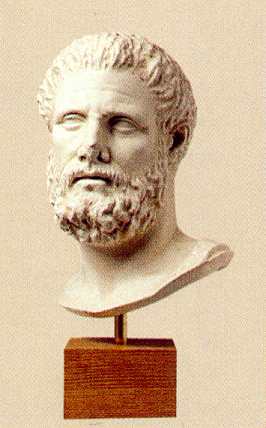1 -
Three Stages in Human Evolution
2
- Stone Age Humans
3 - Greece & Rome
4 - The 17th and 18th Centuries
5 - The Social Reforms of the 19th and 20 Centuries
6 - 1950 to 2000 - The Coming Gerontocracy
7 - The Problem
8 -The
Solution |
 Hippocrates
Hippocrates
|
Some 2,500 years ago, Hippocrates introduced
the rational approach to medicine. While being deferential to the gods and
working within the prevailing cosmological hypotheses, he initiated the
building of medical knowledge base on empirical, clinical observation.
"Whoever having undertaken to speak or write
on Medicine, have first laid down for themselves some hypothesis to their
argument, such as hot, or cold, or moist, or dry, or whatever else they
choose (thus reducing their subject within a narrow compass, and supposing
only one or two original causes of diseases or of death among mankind),
are all clearly mistaken in much that they say ...." Hippocrates:
On Ancient Medicine.
Although great civilizations, the average life-expectancy in Greece
is estimated to have been only 18 and 22 in Rome. However, a small number
of hearty individuals did make it to advanced age - Socrates lived for 70
years, Plato for 80, and Aristotle for 62. These ages were so exceptional
that they were regarded as virtually immortal. |